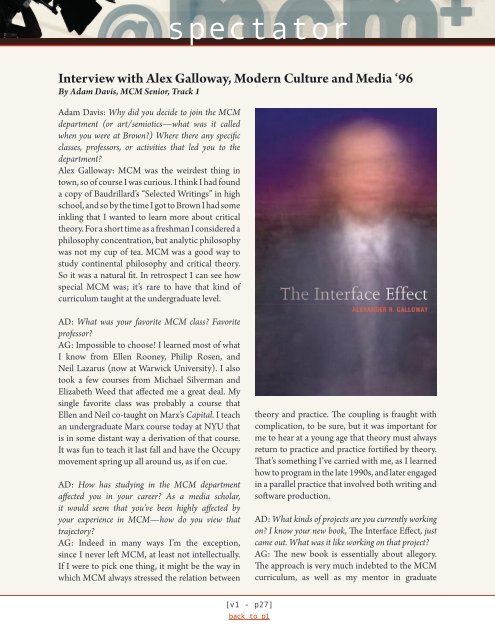Create successful ePaper yourself
Turn your PDF publications into a flip-book with our unique Google optimized e-Paper software.
spectator<br />
Interview with Alex Galloway, Modern Culture and Media ‘96<br />
By Adam Davis, MCM Senior, Track 1<br />
Adam Davis: Why did you decide to join the MCM<br />
department (or art/semiotics—what was it called<br />
when you were at <strong>Brown</strong>?) Where there any specific<br />
classes, professors, or activities that led you to the<br />
department?<br />
Alex Galloway: MCM was the weirdest thing in<br />
town, so of course I was curious. I think I had found<br />
a copy of Baudrillard’s “Selected Writings” in high<br />
school, and so by the time I got to <strong>Brown</strong> I had some<br />
inkling that I wanted to learn more about critical<br />
theory. For a short time as a freshman I considered a<br />
philosophy concentration, but analytic philosophy<br />
was not my cup of tea. MCM was a good way to<br />
study continental philosophy and critical theory.<br />
So it was a natural fit. In retrospect I can see how<br />
special MCM was; it’s rare to have that kind of<br />
curriculum taught at the undergraduate level.<br />
AD: What was your favorite MCM class? Favorite<br />
professor?<br />
AG: Impossible to choose! I learned most of what<br />
I know from Ellen Rooney, Philip Rosen, and<br />
Neil Lazarus (now at Warwick <strong>University</strong>). I also<br />
took a few courses from Michael Silverman and<br />
Elizabeth Weed that affected me a great deal. My<br />
single favorite class was probably a course that<br />
Ellen and Neil co-taught on Marx’s Capital. I teach<br />
an undergraduate Marx course today at NYU that<br />
is in some distant way a derivation of that course.<br />
It was fun to teach it last fall and have the Occupy<br />
movement spring up all around us, as if on cue.<br />
AD: How has studying in the MCM department<br />
affected you in your career? As a media scholar,<br />
it would seem that you’ve been highly affected by<br />
your experience in MCM—how do you view that<br />
trajectory?<br />
AG: Indeed in many ways I’m the exception,<br />
since I never left MCM, at least not intellectually.<br />
If I were to pick one thing, it might be the way in<br />
which MCM always stressed the relation between<br />
theory and practice. The coupling is fraught with<br />
complication, to be sure, but it was important for<br />
me to hear at a young age that theory must always<br />
return to practice and practice fortified by theory.<br />
That’s something I’ve carried with me, as I learned<br />
how to program in the late 1990s, and later engaged<br />
in a parallel practice that involved both writing and<br />
software production.<br />
AD: What kinds of projects are you currently working<br />
on? I know your new book, The Interface Effect, just<br />
came out. What was it like working on that project?<br />
AG: The new book is essentially about allegory.<br />
The approach is very much indebted to the MCM<br />
curriculum, as well as my mentor in graduate<br />
[v1 - p27]<br />
back to p1
















